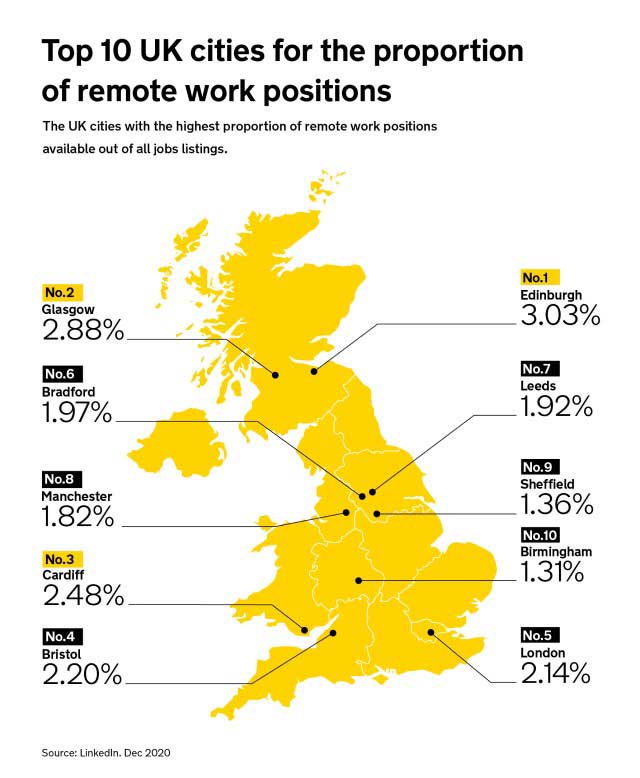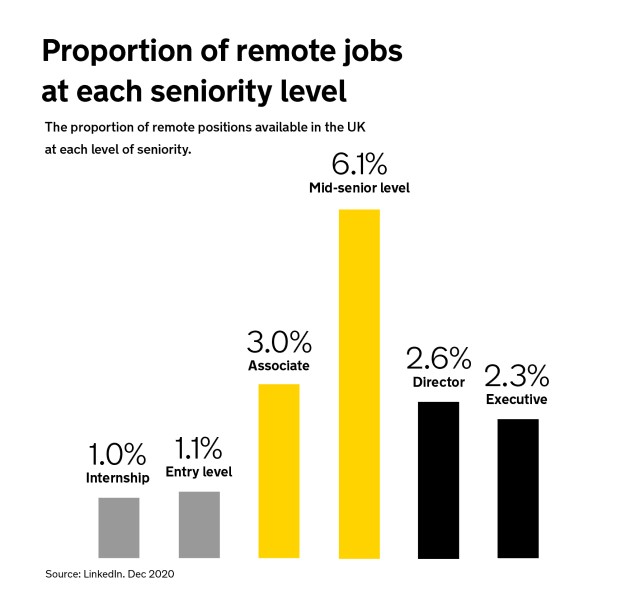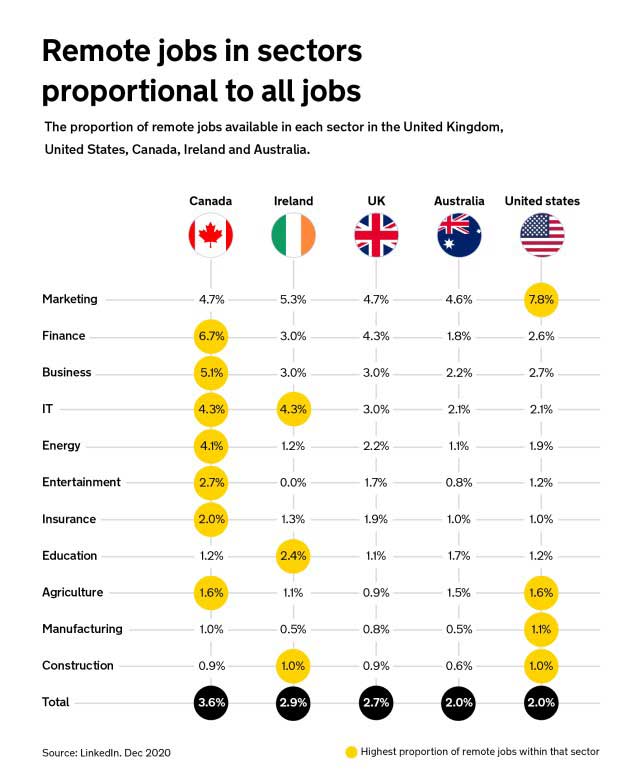Businesses have had to adapt to the coronavirus pandemic in various ways and some found they don't need an office for every role. Certain jobs can be done by working remotely, saving money for both employer and employee on office space, commuting, and daily costs like food and drink.
As lockdown restrictions end many people will want to continue this new flexibility of working from home (WFH), and they may even factor it into their next job search.
We've taken a look at the UK job market and analysed what proportion of jobs are now available on a remote-working basis.¹
Which is the best city for remote working?
What jobs can you do from home?
Who has the best role for home working?
Remote working worldwide
Opinions on working from home
Remote work in the future
Insurance and working from home

Which is the best city for remote working?
Our study used job postings on LinkedIn to find the proportion of total job opportunities which are remote positions, including information on the location, the job sector and the seniority of the role.
Scotland proved to be the best place to look for remote job opportunities: 3.03% of jobs in the Scottish capital, Edinburgh, are available remotely, while in Glasgow it's 2.88%.
On the other hand, just 1.19% of vacancies in Liverpool were advertised as remote positions, and only 1.31% of jobs in Birmingham.

What jobs can you do from home?
If you're aiming to find work where you can stay at home, marketing is the best sector with 4.7% of jobs offering opportunities for remote work.
Other industries equipped for office-free jobs include finance (4.3% of jobs), business (3%) and IT (also 3%). Here you could avoid an expensive commute, and have a better work-life balance.
Businsses dependent on production tasks offer a lower rate of remote working: only 0.8% of manufacturing roles were available outside of the workplace, and 0.9% of construction positions.
Who has the best role for home working?
Seniority plays a significant role in home-working vacancies. Just 1% of internships and entry-level positions are offered as remote opportunities, while 6.1% of mid-level to senior positions can be done without commuting in – over 3% higher than the average for senior roles.
The opportunity to work from home could be a major draw for applicants to junior positions, and the absence of remote positions might restrict potential talent from joining companies. Then again, we need to remember that there are relatively few top-level positions in each company.

Remote working worldwide
Our study also explored how remote roles vary overseas, in Australia, the US, Canada, and Ireland, as well as the UK itself, to see how the 'new normal' is being felt.
The best country is Canada, where 3.6% of openings were offered as remote positions. Unlike the UK, the best bets here for escaping the office are in finance (6.7% of roles) and business (5.1%).
In contrast to Canada, only 2% of roles in Australia and the US had remote opportunities.
If you want to work outside the office in either country, marketing is the best option (4.6% of roles in Australia and 7.8% in the US). The worst options were manufacturing in Australia (0.5%) and construction or insurance in the US (both 1%); industries that rely on manual work are typically unsuitable for home working.
The UK occupies the midpoint among the five countries researched, where an average of 2.7% of job roles offered are remote positions. Allowing for the different geography of each country, Canada and Ireland are more prepared for the new way of working when compared to the UK.
In Ireland, like the UK, marketing is the top place for remote workers, with 5.3% of roles available remotely, followed by IT (4.3%).

Opinions on working from home
In addition to the survey on roles, we asked working professionals in the UK how they felt about working from home or outside the office, and how the 'new normal' has affected them.
Of the respondents, two thirds (66%) said they were currently working from home 5 days a week, while 20% worked outside the office 3 or 4 days, and 16% worked just 1 or 2 days.
Likely as a result of coronavirus pandemic, where working from home where possible was recommended, no one in the survey said they hadn't worked remotely.
As for how people feel about working remotely, nearly 40% said they felt very supported by their employer during the lockdowns. And nearly half felt supported by the flexible working hours offered. But 12% didn't feel supported when it came to the provision of work equipment, which shows a variation among different employers.
Seven out of 10 respondents said they enjoyed working from home, while only 16% actively disliked it. Just 11% would like to return permanently to the office when conditions allow, but the majority favoured at least a split between office and home work; 33% wanted to work from home 1or 2 days a week.
When considering why people prefer working from home, the biggest benefit, cited by 29% of the respondents, was the lack of a commute. Meanwhile 18% liked the lower cost of staying at home, and just under 12% said they liked the flexible working hours.
Conversely, 19% of respondents disliked the loss of work culture, and 10% said they felt isolated working from home. But the actual working space mattered less to most people: less than 5% included poor WiFi, work setup, or lack of equipment among their gripes.
Remote work in the future
If coronavirus lockdowns or restrictions continue, it's likely that new jobs will increasingly offer remote working as a standard option.
But when life does returns to normal, it's uncertain whether attitudes towards remote working will change permanently. Yet given the respondents' opinions in the survey, it's possible that some form of home working is here to stay.
Insurance and working from home
In the move towards working from home, some of us have needed expensive new equipment such as a desk and office chair.
If you're unsure whether or not you need to update your home insurance as a result, contact your insurer to check – particularly if you now run a business from home.
¹ How we did the survey
The survey was done online by AA Passenger Seat in December 2020 and had 343 UK respondents.
We searched the jobs section of LinkedIn to determine job availability by region, sector, job seniority and country. We then filtered these roles for remote working to find the proportion that didn't require office attendance.
Author: The AA. Published 9 June 2021.
